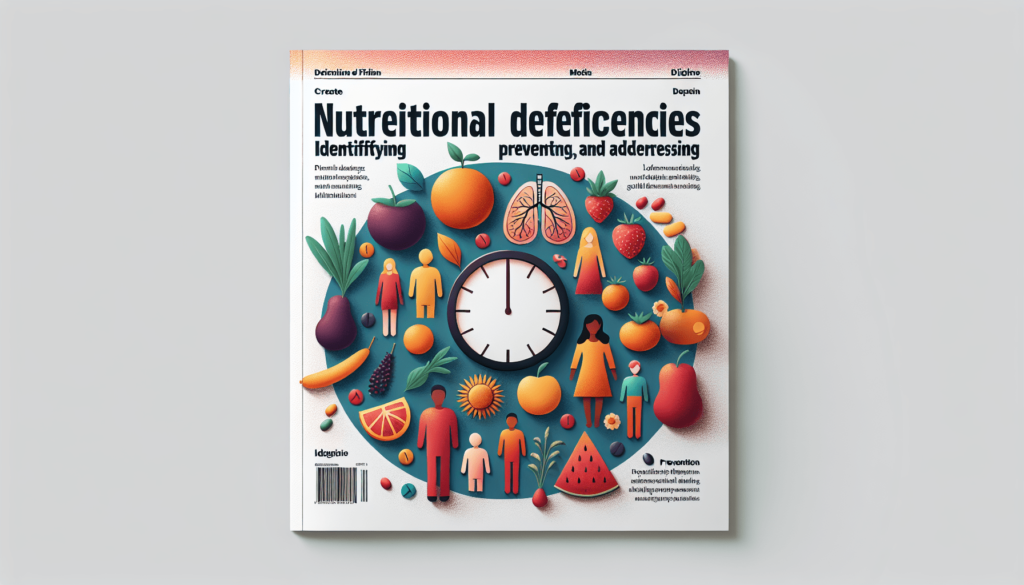Are you aware that your diet may be lacking important nutrients? In our article “Nutritional Deficiencies: Identifying, Preventing, and Addressing,” we explore the significance of identifying these deficiencies, the best strategies to prevent them, and how to address them if they occur. By understanding the importance of nutrition and learning how to maintain a balanced diet, you can ensure that you stay healthy and vibrant. Join us on this journey as we delve into the world of nutritional deficiencies and empower you with the knowledge to lead a nourished life.

Overview of Nutritional Deficiencies
Understanding the concept of nutritional deficiencies
Nutritional deficiencies occur when the body does not receive adequate amounts of essential nutrients to function optimally. These essential nutrients include vitamins, minerals, protein, carbohydrates, and fats. Each nutrient plays a unique role in maintaining overall health and well-being. When the body lacks these nutrients, various health problems can arise. It is important to understand the concept of nutritional deficiencies to recognize their significance and take steps to prevent and address them.
Effects of nutritional deficiencies on overall health
Nutritional deficiencies can have numerous detrimental effects on overall health. They can weaken the immune system, making individuals more susceptible to infections and diseases. Deficiencies in vitamins and minerals can lead to impaired growth and development, compromised organ function, decreased cognitive function, and reduced energy levels. They can also contribute to mental health issues such as depression and anxiety. It is crucial to address and correct nutritional deficiencies to support optimal health and well-being.
Common causes of nutritional deficiencies
There are various common causes of nutritional deficiencies. These can include inadequate intake of nutrient-rich foods, poor diet quality, restricted diets due to allergies or dietary preferences, digestive disorders that hinder nutrient absorption, and certain medical conditions that increase nutrient requirements. Additionally, socioeconomic factors, such as low income and limited access to nutritious foods, can contribute to nutritional deficiencies. Understanding the common causes is crucial for implementing effective preventive measures and interventions.
Identifying Nutritional Deficiencies
Recognizing signs and symptoms of nutritional deficiencies
Recognizing the signs and symptoms of nutritional deficiencies is essential for early detection and intervention. Symptoms can vary depending on the specific nutrient deficiency but may include fatigue, weakness, frequent infections, skin problems, hair loss, poor wound healing, and reduced cognitive function. Being aware of these signs and symptoms can prompt individuals to seek medical advice and appropriate testing to identify and address any underlying nutritional deficiencies.
Importance of regular health screenings and blood tests
Regular health screenings and blood tests are vital for identifying nutritional deficiencies. These screenings, conducted by medical professionals, can assess the levels of various nutrients in the body and detect any deficiencies. Blood tests can measure levels of vitamins, minerals, and other essential nutrients, providing valuable information about an individual’s nutritional status. Including these tests as part of routine health check-ups can help identify deficiencies early on and take necessary steps to address them.
Role of medical professionals in identifying deficiencies
Medical professionals, including physicians, dietitians, and nutritionists, play a crucial role in identifying nutritional deficiencies. They have the knowledge and expertise to interpret test results, evaluate symptoms, and recommend appropriate interventions. By working with medical professionals, individuals can receive tailored advice on dietary changes, supplementation, and lifestyle modifications to address their specific nutritional deficiencies effectively.
Preventing Nutritional Deficiencies
Importance of a balanced diet and variety of foods
A balanced diet that includes a variety of nutrient-dense foods is key to preventing nutritional deficiencies. Eating a wide range of fruits, vegetables, whole grains, lean proteins, and healthy fats ensures a diverse intake of essential nutrients. Incorporating foods from different food groups helps provide the body with the necessary vitamins, minerals, and other nutrients it needs to function optimally. A balanced diet is the foundation for preventing nutritional deficiencies and supporting overall health and well-being.
Key nutrients and their food sources
Understanding key nutrients and their food sources is essential for preventing deficiencies. Some important nutrients to focus on include iron, calcium, vitamin D, vitamin B12, and omega-3 fatty acids. Iron-rich foods include red meat, beans, lentils, and dark leafy greens. Calcium sources include dairy products, fortified plant-based milks, and leafy greens. Vitamin D can be obtained from exposure to sunlight and fortified foods. Vitamin B12 is found in animal products and fortified plant-based foods. Omega-3 fatty acids are abundant in fatty fish, flaxseeds, and walnuts. By incorporating these nutrient-rich foods into the diet, individuals can meet their nutritional needs and reduce the risk of deficiencies.
Dietary guidelines and recommendations for different age groups
Dietary guidelines and recommendations provide valuable guidance on meeting nutrient requirements for different age groups. These guidelines take into account age-specific nutritional needs and provide suggestions on portion sizes, food choices, and nutrient intake. Following these guidelines can help ensure adequate nutrient intake and prevent deficiencies. It is important to consult the specific guidelines for different age groups, such as children, adolescents, adults, and older adults, to tailor dietary choices accordingly.
Addressing Nutritional Deficiencies
Medical interventions for severe deficiencies
In cases of severe nutritional deficiencies, medical interventions may be necessary. This can include intravenous administration of specific nutrients, such as iron or vitamin B12, when oral supplementation is not sufficient. Medical professionals closely monitor these interventions to ensure optimal dosage and effectiveness. Severe deficiencies often require medical supervision and guidance to correct nutrient imbalances and restore optimal health.
Supplementation and fortified foods
Supplementation and the consumption of fortified foods can be effective in addressing nutritional deficiencies. Dietary supplements, such as multivitamins or specific nutrient supplements, can provide additional nutrients that may be lacking in the diet. Fortified foods are products that have had specific nutrients added to them during processing to enhance their nutritional content. Examples include fortified cereals with added vitamins and minerals or plant-based milks fortified with calcium and vitamin D. Incorporating supplements and fortified foods, under the guidance of a medical professional, can help restore nutrient levels and address deficiencies.
Lifestyle changes and dietary modifications
Lifestyle changes and dietary modifications are often necessary to address nutritional deficiencies. Making sustainable changes, such as increasing intake of nutrient-dense foods, reducing intake of processed foods, and incorporating regular physical activity, can support overall health and well-being. Additionally, addressing underlying factors that contribute to poor diet quality, such as stress or emotional eating, can support long-term dietary changes and minimize the risk of nutritional deficiencies.

Specific Nutritional Deficiencies and Their Impacts
Iron deficiency and its effects on energy levels
Iron deficiency can lead to anemia, resulting in reduced energy levels and fatigue. Iron is essential for the production of hemoglobin, a molecule that carries oxygen to body tissues. Inadequate iron levels can impair the body’s ability to oxygenate tissues, leading to feelings of lethargy, weakness, and reduced stamina. Consuming iron-rich foods and, if necessary, taking iron supplements can help address iron deficiency and improve energy levels.
Vitamin D deficiency and its impact on bone health
Vitamin D deficiency can lead to poor bone health, as it is crucial for calcium absorption and bone mineralization. Low levels of vitamin D can contribute to reduced bone density, osteoporosis, and an increased risk of fractures. Regular sun exposure and consuming vitamin D-rich foods, such as fatty fish and fortified dairy products, can help prevent vitamin D deficiency. Supplementation may be necessary in individuals with limited sun exposure or certain medical conditions affecting vitamin D metabolism.
Calcium deficiency and its connection to osteoporosis
Calcium deficiency can contribute to the development of osteoporosis, a condition characterized by weak and brittle bones. Calcium is important for the formation and maintenance of strong bones and teeth. Insufficient calcium intake can lead to decreased bone density, increasing the risk of fractures. Consuming calcium-rich foods, including dairy products, leafy greens, and fortified plant-based milks, can help prevent calcium deficiency and support optimal bone health.
Nutritional Deficiencies in Different Population Groups
Children and adolescents
Children and adolescents are particularly vulnerable to nutritional deficiencies due to their rapid growth and development. Inadequate nutrient intake during these crucial stages can lead to delayed growth, poor cognitive development, and compromised immune function. Providing a balanced diet that includes a variety of nutrient-rich foods is essential for meeting the specific nutritional needs of children and adolescents. Regular pediatric check-ups can help monitor growth and detect any potential deficiencies early on.
Pregnant and breastfeeding women
Pregnant and breastfeeding women have increased nutrient requirements to support fetal growth and milk production. Deficiencies in key nutrients, such as iron, folate, and iodine, can have detrimental effects on both the mother and the baby. Prenatal care, including regular check-ups and nutritional counseling, is vital for ensuring adequate nutrient intake and addressing any deficiencies. Supplementation may also be recommended to support the increased nutrient demands during pregnancy and breastfeeding.
Elderly individuals
Elderly individuals may be at higher risk of nutritional deficiencies due to factors such as reduced appetite, impaired nutrient absorption, and limited access to nutrient-rich foods. Deficiencies in nutrients such as vitamin B12, vitamin D, calcium, and protein can lead to muscle weakness, increased risk of falls, and compromised immune function. Regular health screenings, dietary modifications, and supplementation if needed, can help address and prevent nutritional deficiencies in the elderly population.
Risk Factors for Nutritional Deficiencies
Low socioeconomic status and limited access to nutritious foods
Low socioeconomic status and limited access to nutritious foods can significantly increase the risk of nutritional deficiencies. Individuals with limited financial resources may have difficulty affording nutrient-rich foods and rely on lower-cost, processed options. This can result in inadequate nutrient intake and an increased likelihood of deficiencies. Addressing food insecurity and providing access to affordable, healthy foods are crucial steps in combating nutritional deficiencies in economically disadvantaged populations.
Restricted diets and dietary restrictions
Restricted diets, such as veganism or specific dietary restrictions due to allergies or intolerances, can increase the risk of nutritional deficiencies if not carefully planned. Eliminating certain food groups can limit the intake of essential nutrients. It is important for individuals with restricted diets to ensure they are obtaining all necessary nutrients through alternative food sources or appropriate supplementation. Consulting with a registered dietitian can help develop a well-balanced eating plan that meets specific dietary needs while preventing nutritional deficiencies.
Digestive disorders affecting nutrient absorption
Digestive disorders, such as celiac disease, inflammatory bowel disease, or conditions affecting the pancreas, can hinder nutrient absorption and increase the risk of deficiencies. These disorders can impair the body’s ability to break down and absorb nutrients from food. Medical management, including dietary modifications and supplementation under medical guidance, is crucial to address nutrient deficiencies and support gastrointestinal health.
Addressing Nutritional Deficiencies in Developing Countries
Challenges faced in developing countries
Developing countries face numerous challenges in addressing nutritional deficiencies. Limited availability and affordability of nutritious foods, inadequate healthcare infrastructure, and lack of awareness and education about proper nutrition contribute to the prevalence of deficiencies. Factors such as political instability, conflict, and natural disasters can exacerbate the situation, further hindering efforts to combat deficiencies. Addressing these challenges requires collaborative efforts from governments, NGOs, and international organizations.
Strategies for improving nutrition in resource-limited settings
Several strategies can be employed to improve nutrition in resource-limited settings. These include promoting agricultural practices that increase the production and availability of nutrient-rich foods, implementing nutrition education programs to raise awareness about healthy eating habits, and establishing community-based interventions that focus on improving access to nutritious foods. Additionally, fortification of staple foods with essential nutrients can provide an effective and cost-efficient solution in resource-limited settings.
Role of international organizations and initiatives
International organizations, such as the World Health Organization (WHO) and the United Nations International Children’s Emergency Fund (UNICEF), play a pivotal role in addressing nutritional deficiencies globally. These organizations work towards raising awareness, promoting research, and implementing programs and initiatives that focus on improving nutrition and combating deficiencies. Collaborative efforts between governments, NGOs, and international organizations are crucial to achieving sustainable solutions and ensuring optimal nutrition for all.
Impact of Nutritional Deficiencies on Mental Health
Link between nutrition and mental well-being
There is a strong link between nutrition and mental well-being. Nutritional deficiencies can influence brain chemistry, impacting mood, cognition, and overall mental health. Adequate intake of essential nutrients, such as omega-3 fatty acids, B vitamins, and magnesium, is essential for maintaining optimal brain function and supporting mental well-being. Nutrient deficiencies, on the other hand, can contribute to the development or exacerbation of mood disorders, such as depression and anxiety.
Effects of deficiencies on cognitive function and mood disorders
Nutritional deficiencies can negatively affect cognitive function, memory, and concentration. Deficiencies in B vitamins, particularly vitamin B12 and folate, have been linked to cognitive impairments and an increased risk of age-related cognitive decline. Additionally, deficiencies in omega-3 fatty acids have been associated with an increased risk of depression and other mental health disorders. Addressing nutritional deficiencies and ensuring adequate nutrient intake can play a crucial role in supporting cognitive function and promoting positive mental health outcomes.
Importance of holistic approach to mental health
Taking a holistic approach to mental health, which includes addressing nutritional deficiencies, is essential for optimal well-being. Alongside other strategies such as therapy, stress management, and regular physical activity, ensuring a nutrient-rich diet can support mental health outcomes. Incorporating foods rich in omega-3 fatty acids, B vitamins, and antioxidants, while reducing the intake of processed foods and added sugars, can have a positive impact on mental well-being. It is important to recognize the multifaceted nature of mental health and address all contributing factors, including nutrition.
Conclusion
In conclusion, understanding, preventing, and addressing nutritional deficiencies is crucial for maintaining optimal health and well-being. By recognizing the signs and symptoms, individuals can take early action to correct deficiencies. Regular health screenings and working with medical professionals play a vital role in identifying deficiencies accurately. Preventing deficiencies through a balanced diet, incorporating key nutrients, and following dietary guidelines for different age groups is essential.
For those with existing deficiencies, medical interventions, supplementation, and fortified foods can help restore nutrient levels. Additionally, addressing the unique nutritional needs of different population groups, such as children, pregnant women, and the elderly, is important for preventing deficiencies. Identifying risk factors, such as socioeconomic status and restricted diets, helps target interventions effectively.
Addressing nutritional deficiencies in developing countries requires collaborative efforts and strategies tailored to resource-limited settings. International organizations and initiatives play a critical role in implementing programs and initiatives to combat deficiencies globally.
Finally, recognizing the impact of nutritional deficiencies on mental health underscores the importance of a holistic approach. Nutrition plays a significant role in supporting cognitive function and mental well-being. Efforts to raise awareness about nutritional deficiencies and promote education are vital for combating deficiencies on both individual and global levels. With increased awareness and collaborative efforts, the future holds promise for addressing and preventing nutritional deficiencies, leading to improved health outcomes for all.

